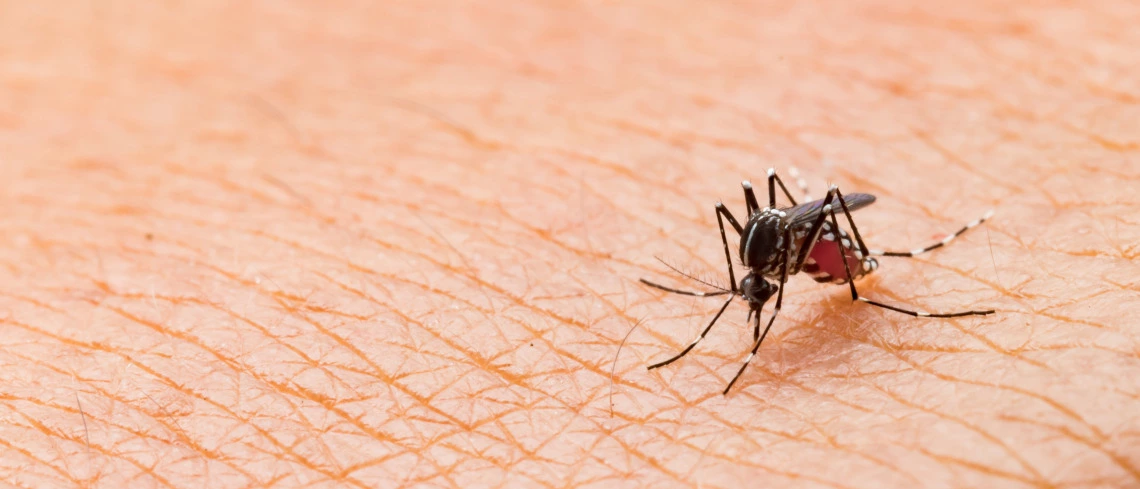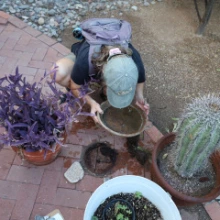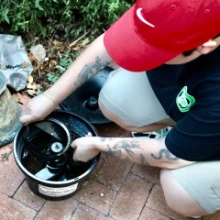Mosquito study tests way to control bugs that annoy us and can spread diseases
The Tucson pilot project aims to reduce the population of Aedes aegypti mosquitoes, which can spread zika, yellow fever, and dengue.

This African mosquito species, Aedes aegypti, is mostly a nuisance in southern Arizona now, but that is likely to change as dengue, a disease spread by the mosquito, has been found as close as Hermosillo, Mexico.
A University of Arizona Cooperative Extension researcher is laying groundwork to fight mosquito-borne diseases that are not yet spreading in our state but likely will.

University of Arizona Cooperative Extension researcher Kathleen Walker checks a backyard planter dish for mosquito larvae.
Brad Poole
Kathleen Walker, an entomologist and assistant Extension specialist, studies the way insects spread, or vector, diseases. Recently she got $50,000 from the UArizona One Health initiative to try to find out if a hormone can control an especially annoying mosquito species that can also spread disease.
“It’s the Aedes aegypti mosquito. It doesn’t have a cute common name. The way that people might know it is it’s the zika vector. It also vectors dengue, yellow fever and chikungunya,” Walker said.
The species does not spread West Nile, which has become a problem in Arizona because of different mosquitoes, those in the genus Culex. The African mosquito Walker is studying has been in the Americas since the early days of the slave trade and lives in every corner of the nation, including Arizona since at least the early 1900s, she said.
“It’s here to stay,” she said.
Using black buckets the size of gallon jugs, Walker and her team of eight student researchers are luring female mosquitoes to lay eggs at 67 midtown homes. When the insects land in the buckets, they pick up pyriproxyfen, an insect growth regulator that prevents mosquitoes from becoming adults and breeding or biting. The females then spread the hormone to other receptacles where they lay eggs.

Graduate student and research team manager Bailey Payne checks a mosquito trap in midtown Tucson.
Brad Poole
Graduate student Bailey Payne is managing the research team. They go to each home weekly to maintain the traps and make sure they have water in them. The hormone method, which has proved effective in other parts of the world, is a new tool in southern Arizona’s fight against the tiny pests.
“Aedes have been here for a long time, and they’re developing resistance to (pesticides) really fast. They’re hard to kill, so we’re trying to find new methods to decrease the population here in Tucson,” Payne said.
The project will also include education, to try to get everyone in Blenman-Elm neighborhood helping, she said.
“It doesn’t work unless everyone is in on it, working as a team. We see people who are doing a great job and still seeing mosquitoes, and it’s because their neighbors have a ton of water reservoirs,” Payne said.
Walker and her team are trapping and counting female mosquitoes, and finding and counting the larvae from eggs laid in hormone-laden receptacles.
“Our goal is to see fewer adult mosquitoes in the neighborhood that has the traps,” Walker said.
They are not studying disease transmission, such as West Nile or dengue, because Aedes aegypti doesn’t vector disease here yet.
Walker has studied this mosquito in Mexico, where the species carries dengue fever in Hermosillo but not farther north in Nogales or Tucson. Dengue and zika are limited geographically because of climate, she said.
In 2016, zika emerged in Miami. That outbreak was controlled only after more than a month of repeated spraying. Dengue has appeared in Texas and Florida, and one single case was found in Maricopa County last year, Walker said.
“Certainly, there’s a value for Arizonans to protect themselves, because we are almost certainly going to get more local cases of dengue at some point, but the bigger issue is for the world at large,” where half of all people live under the threat of dengue fever, she said.
On a recent evening, Walker and Payne visited two homes looking for mosquito larvae and making sure the traps were intact. They checked each front and back yard for standing water, pouring any they found into a cup to check for larvae.
This time there were none.
While Culex mosquitoes, which spread West Nile, have been known to fly up to a mile, the low-flying Aedes aegypti rarely ranges more than 50 meters from home, Walker said.
“And they’re really obnoxious mosquitoes. They love people. They will bite people preferentially over any other animal. People care about nuisance biting. It affects your quality of life,” she said.
Homeowner Rebecca Fealk has lived in Blenman-Elm neighborhood in 2021. She and her partner agreed to be a part of the study to help further the research and to hopefully get rid of mosquitoes, Fealk said.
“When I do get bitten, I tend to swell up, so anything I can do to reduce that discomfort would be wonderful,” she said.
For more information about Extension work on mosquitoes, please see our mosquito resource page.
